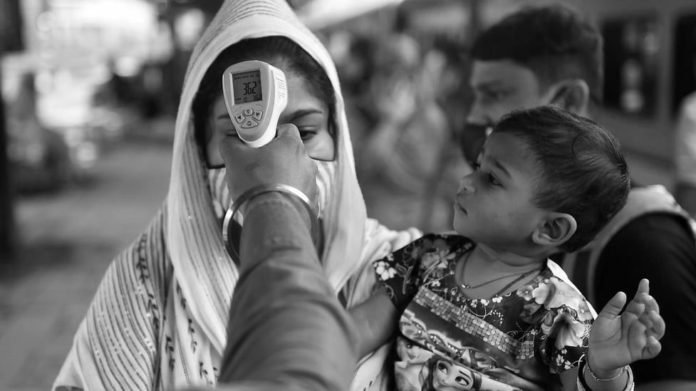India reported 1,27,952 new Covid cases today, 14% lower than yesterday. The positivity rate fell to 7.9%.The active cases constitute 3.16 per cent of the total infections, while the national COVID-19 recovery rate decreased to 95.64 per cent.
Since December, the number of Covid cases has been rising rapidly due to the new variant Omicron. India’s active caseload currently stands at 13,31,648.
There were 1,059 new Covid-related deaths in the last 24 hours. The death count from COVID-19 crossed 500,000 on Friday, a level many health experts say was breached last year but obscured by inaccurate surveys and unaccounted dead in the hinterlands, where millions remain vulnerable to the disease.
At least 2,30,814 recoveries in the last 24 hours took the total number of recoveries to 4,02,47,902.
The daily Covid positivity rate stands at 7.98 per cent while the weekly positivity rate stands at 11.21 per cent.
The new cases were recorded after 16,03,856 tests were conducted in the last 24 hours. A total of 73.79 crore Covid tests have been conducted in India till now.
Nearly 169 crore COVID-19 vaccine doses have so far been administered in the country, the health ministry said. Over 42 lakh (42,95,142) vaccine doses were administered till 7 pm on Friday.
Delhi reported 2,272 fresh COVID-19 cases and 20 deaths, while the positivity rate dropped to 3.85 per cent. The national capital has relaxed COVID-19 restrictions further in view of a dip in the number of cases.
Maharashtra reported 13,840 new cases during the last 24 hours. State health minister Rajesh Tope has said the number of cases had begun declining statewide and predicted that the third wave of the pandemic might get over by the second or third week of March.
Kerala reported 38,684 new cases of COVID-19 during the last 24 hours while 28 people died.
Arunachal Pradesh reported 196 fresh COVID-19 cases, while 407 more patients recovered from the disease in the last 24 hours, a health department official said on Saturday.
The state’s coronavirus tally rose to 63,315 with the single-day infections, and the recovery count stood at 61,039, he said.
The death toll remained at 291, as no new fatality was reported since Friday, State Surveillance Officer Lobsang Jampa said.
Odisha’s COVID-19 tally rose to 12,64,705 on Saturday as 2,603 more people tested positive for the infection, while 22 fresh fatalities pushed the state’s coronavirus death toll to 8,711, a health bulletin said.
It is the lowest single-day spike since January 6. The daily cases plunged by 46 per cent from 4,842 a week ago. The state had registered 2,697 cases and 23 fatalities on Friday.
The daily positivity rate slightly dipped to 4.13 per cent from 4.44 per cent on the previous day as 63,045 samples were tested for COVID-19 in the last 24 hours.
Khurda district reported the highest number of 444 cases, while 349 children were among the 2,603 new patients in the state.
More about Omicron
The Omicron variant has been called a variant of concern by WHO based on studies that shows it has several mutations.
Still a lot of research is underway to evaluate its transmissibility, severity and reinfection risk.
The Omicron variant has been detected in several regions of the world. WHO reports that the likelihood of the Omicron variant spreading further globally is high.
It is not currently known if the Omicron variant is more or less severe than other strains of COVID-19, including Delta. Studies are ongoing and this information will be updated as it becomes available.
It is not yet clear whether Omicron can spread more easily from person to person compared to other variants, such as Delta.
However, being vaccinated and taking precautions such as avoiding crowded spaces, keeping your distance from others and wearing a mask are critical in helping to prevent the spread of COVID-19, and we know these actions have been effective against other variants.
Researchers are looking into any potential impact the Omicron variant has on the effectiveness of COVID-19 vaccines. Although information is still limited, WHO believes it is a reasonable assumption that the currently available vaccines offer some protection against severe disease and death.
It is also important to be vaccinated to protect against the other widely circulating variants, such as the Delta one. When it’s your turn, make sure to get vaccinated. If your vaccination involves two doses, it’s important to receive both in order to have the maximum protection.
According to WHO, early evidence suggests that people who have previously had COVID-19 could be reinfected more easily with Omicron, in comparison to other variants of concern. Information is still limited though and we will share updates as it becomes available.
Source: UNICEFRead more Health News
Latest update Omicron

